- Home
- Paullina Simons
Road to Paradise Page 12
Road to Paradise Read online
Page 12
But it was impotent rage. I couldn’t go back to Aunt Betty’s, and I knew it.
Gina looked composed and unconcerned; she rubbed my arm, said shh, tried to use a soothing voice, as if she were now the mumsie, and I was the unreasonable tot demanding a pony. “It’s fine,” she said. “We’ll be okay. So we’ll go to St. Louis? What’s a couple of days in the scheme of things? I’ve never been to St. Louis. Don’t you want to see the Arch? We can go all the way to the top. Did you know it’s the world’s tallest man-made monument, at 630 feet?”
I was so tired. I wished Gina, all perky and bubbly, could drive so I could sleep. If wishes were horses.
FOUR
THE LIGHT AT PICNIC MARSH
1
Candy
We got back on the road around five. It was time to start thinking about dinner, and we hadn’t gone but ten miles from Aunt Betty’s house, our sum total for the day. I couldn’t believe I told Emma I’d be back in two and a half weeks. I must’ve been delusional.
“Hey, you want a Blue Jay pumpkin? Look, they’re only a quarter.”
“No.”
“Look at the name of the town.” Gina laughed. “Valparaiso. Isn’t that funny?”
I didn’t know what was so funny.
“We’re in Indiana. You’ve got Joe’s Bar and Grill, and you’ve got Tony’s Car Repair next to Pump’s On Restaurant, next to Tasty Taco, in Valparaiso?”
“So?”
“You don’t think Tasty Taco is a little too hoi polloi for Valparaiso?”
“No. I just think the people who named the town came from Chile.”
“I think, Miss Literal,” Gina said, “somebody’s lost her funny bone.”
“Completely,” I agreed. “I’m cranky like a child.”
I glanced over at Gina sitting there, whistling a tune, a smile on her face. And then he’ll settle down . . . Eddie was planning to marry someone else and she was whistling. In some quiet little town . . . If my boyfriend were planning to marry someone else, I sure wouldn’t be whistling. Perhaps she didn’t care. But then why was she riding shotgun across the continent and the Great Divide to stop him? Either you care or you don’t, but what’s with the whistling? I pulled her hair. “You’re not worried?” I asked.
“ ’Bout what?”
“Anything.”
“I’m not worried ’bout nothin’,” said Gina, wiping her head and humming. You know he’ll always keep moving . . .
We passed a little brown sign that said “Picnic Area at Great Marsh State Park.” That made me laugh.
“Oh, now she’s amused.” You know he’s never gonna stop moving . . .
“Because it’s funny. First of all, why in the world would anyone have a state park in a marsh? That’s first. And second, why would you want to have a picnic there?”
“Not as funny as Valparaiso.”
“Funnier.”
“Don’t think so.”
“Yes.”
“No.”
Suddenly we fell mute as if the power had just gone out. Up ahead on Dunes Highway near Fremont, at the traffic light, on the right-hand side of the road across from the Great Marsh Picnic Grounds, with her thumb in the air was the girl from the black truck in Maryland. She must’ve recognized our car because she smiled at us and waved happily.
Gina and I blinked, not believing our eyes.
“Oh my God,” I said. “Is that the same—”
“Holy shit. Shh. Think so.”
“Why are you saying shh? It can’t be.”
“Well, look!”
“It can’t be!” I exclaimed.
“It most certainly is.”
“God, what do we do?”
“I don’t know. Holy shit. Can you turn somewhere?”
“Turn where!” We were on U.S. 12, with the lake on the right and the marsh picnic grounds on the left, and nowhere to turn. The railroad yards and the steel mills were up ahead. The headquarters of U.S. Steel were up ahead. And so was she. I don’t know what loomed larger. The light was turning red; I was forced to slow down and come to a stop. Right next to her. Her thumb still out, she came closer, staring expectantly into our passenger window.
“What do we do!” That was me, in a deathly whisper. I was flabbergasted, blinking furiously, as if hoping that she, like the haunting by Ned, would evaporate. I mean, it couldn’t be her. Not here, it just couldn’t be. We weren’t meant to be here; why was she? We had passed her in another life, days ago on a local road four states away; what wind blew her here? What wind blew us here? “What do we do, Gina . . .”
“Nothing.” Gina turned to me. “What are you talking about? Nothing. Look straight ahead, like when the homeless in the city come to wash our windshield. Look away. Ignore her. The light’s gonna change soon.”
“Gina . . .” I couldn’t look away. I was staring at the girl outside the window. Her smile was broad, like me she was chewing gum, smiling like Gina (who was no longer even faintly smiling). She looked so young, and she opened her hands at us, as if to say, “Well?” standing in her little blue skirt, skinny, her hair all weird. In her hands she held a shopping bag. What I was seeing was a cataclysmic coincidence, against all probabilities, impossible in a rational world, in a statistical world, in a world ruled by my plan.
“It’s fate, Gina Reed,” I said.
“Are you kidding me?”
“No.” I looked at the girl again. “It’s a supernatural event.”
“You know what we do when the gods show us what they have in store for us?” Gina said. “We snub our noses at them, and do something else, just to shake things up, to make it less boring.”
“You’re not curious?”
“No! I’m non-curious. I’m the anti-curious. I’m negatively curious.”
“Come on. We’re giving the stupid rats a ride. Why do the dogs rate a Shelby, but not the girl? Open your door.”
“No! Are you out of your mind?”
“You know she isn’t headed to St. Louis.”
“How do you know where she’s headed?” Gina exclaimed. “We’re not supposed to be headed to St. Louis.”
“True. Look, we’ll give her a ride to I-80, drop her off at the first rest stop, no harm, no foul. It’s just a few miles. I’m dying to find out how she got here. Look at her. She’s a kid. She could be your sister. That’s Molly out there.”
“No.”
I got some energy back. The light was still red, and she was outside our car with her hands open. “Gina, it’s a miracle.”
“No, it isn’t. A miracle is a good thing.”
“It’s like magic!”
“Yes, black magic.”
“We forgot all about her, and yet here she is, hitching on Route 12 on the Great Lake. At our red traffic light. She is the extraordinary. She is the unexpected. Let’s give her a ride.” The light finally turned green. The sedan behind honked to speed us on.
“Please, no,” said Gina. “Sloane, keep going. We’re doing well, we’re friends again, don’t ruin it, don’t spoil it.”
My heart squeezed. I almost sped up, if only the pull of the unknown weren’t so great, the pull of something I didn’t understand, but wanted to. This wasn’t in my spiral notebook. It could never be. This was no random event. And if this wasn’t, then the black truck wasn’t. And if the black truck wasn’t random, then nothing in the world was random. I had felt so bad back then for being such a chicken, for not letting her in. How often did you get a second chance? “I’m not going to spoil it. Come on. I traipsed around the country for your aunts and your dogs. What’s the big deal? You said so yourself. It’s just for a few miles. To the interstate. Let’s help her out. Or some horrible guy in a black truck is going to pick her up. Is that what you want?”
“I don’t care!” Gina shook her head. “It’s a terrible mistake. We made a pact. We promised each other. No pickups.”
“Where’s the harm?”
“We made a pact,” she repeated doggedly. The
cars kept honking.
“Well, I know, but I was talking about sweaty men with tattoos. This is to help a girl like us. What do you think she’s going to do? Come on.”
“I’m asking you, please no.”
But I wasn’t listening anymore. I crossed through the light and pulled onto the shoulder, rolling down my window, sticking my arm out, waving her on, honking twice. I saw her in the rearview mirror, running toward the car. Not quite running, but skipping, like skipping from happiness. A big smile split her face, her shopping bag, her hobo bag flapping.
“Open your door, Gina,” I said quietly.
“I can’t believe you’re doing this. I can’t believe you are picking up a hitchhiker. But then again, what’s a pact to you, right?” She huffed out and flipped forward her seat. The hot summer air swooshed in, and the girl fell in, hips first, then bags, then legs, all teeth, beaming, and said, “Thanks, you’re a Godsend.” Gina slammed the door shout.
I turned to the girl and didn’t know what to say.
She was one peculiar duck up close. She had short spiky hair bleached in punk strands of hot pink and jet black, some standing up, some falling to her neck. She wore thick, black eye-makeup and red glossy lipstick. The makeup was so heavy, I thought it was perhaps to disguise how young she was. Rings perforated her ears from the lobe to the top cartilage. Her body was weighted down with costume jewelry: red, white, and blue stars and stripes, copper bangles, silver hearts. Around her neck hung chains of all lengths, rings adorned fingers and wrists, three bracelets circled each bare ankle, and her tongue was spiked by a small silver ball. Under her short halter, even the belly button of her flat stomach was pierced. I’d never seen that before, except in pictures of African girls in National Geographic. She clanged as she sat and breathed; one part or another of her jangled like wind chimes. She had tattoos of flowers on her bare shoulders, and just the top of a red heart showed saucily at the edge of her pink top. Her skin was white as if her body had never been touched by the sun. Her voice was throaty. I rubbernecked her the way I had rubbernecked the nuclear power reactor. More. I couldn’t look away.
She smiled widely showing all her teeth; the silver ball twittered. “Like my noise?” She shook her head to ring herself like a bell.
“Looks painful,” I said, “but good,” then lower, “good in a painful sort of way.”
“So,” she drawled, “second time’s the charm, eh?”
Embarrassed that she remembered us so well gaping at her predicament before deciding to keep going, I turned red.
“Don’t worry ’bout a thing.” She stuck out her hand. Her brown eyes were merry. “I’m Candy. Nice to meet ya.” She popped a gum bubble. I shook her little hand and said I was Shelby. “Love it,” she said. “Shall BE?”
“No. SHELL-bee.”
“I’m Gina,” said Gina. “Sloane, are you going to drive or you going to sit here all day?” Slowly I moved on. “So where are you headed?”
“I’m just along for the ride,” the girl replied. “Thanks, Ginashelby.” She sat back, a relaxed smile on her face. “Is there anything to eat? I’m starved.”
“Nothing in the car.” That Gina.
“Gina, give her the potato chips from yesterday.”
“Oh, I love potato chips from yesterday!” She flicked her gum out of Gina’s window.
Gina, glaring at me, passed her the open bag.
“We can give you a ride to the interstate,” Gina said. “Is that okay?”
“That’s okay,” the girl said, her mouth full. “But where are you two headed?”
“We have a little errand farther south. But we have no problem taking you to I-80.”
I love how Gina talked about I-80 like she knew where it was. “Um, Gina,” I asked, “how long, you think, till I-80? In your estimation?”
She gave me a shut-up stare and turned back to the girl sitting behind her. I angled my rearview mirror so I could see her better. I was open-mouthed at the whole thing; it was taking me a while to figure out what to say, to float down from the hot balloon of the shock of her in my car.
“What kind of car is this?” Candy asked. “It’s cute. A little cramped in the back.”
“It’s a 1966 Shelby Mustang,” I said, tail opening.
“Oh, it’s named after you! Love it.”
“So, will I-80 be okay?” Gina persisted.
“I think I-80 is in like ten miles,” Candy said quietly. She was a little too soft-spoken and throaty, I had to turn the music way down to hear her. “Where are you gals going after that?”
“Really far south. To St. Louis.”
“Oh,” she said, licking out the salt from the bottom of the potato chip bag, “I’ll take a ride with you to St. Louis. Man, these were good. Got any more?”
“No,” Gina said slowly, turning to face the front and folding her arms on her chest. She kept glaring at me, in a bug-eyed meaningful way until I finally sighed.
“Candy,” I said, “we can’t take you to St. Louis because it’s really far and we’re not getting there till tomorrow. How about we let you off when we stop for food, okay?”
She didn’t say anything. She was leaning down to glance into the pet carrier, and her taken aback, slightly puzzled face told me she wasn’t sure what she was looking at. She stuck her finger into the cage. “What are these?” One of them stopped barking long enough to nip her finger.
“Chihuahuas. Keep your hands away,” said Gina. “They bite.”
“No kidding.” She laid her hands primly on her lap. “But you still didn’t tell me what they are.”
“Um—dogs?”
“Those are dogs?” She was a composed girl, not a fidgeter. Her hands and body remained still. Carefully, she moved the crate away so it wouldn’t touch her. Gina turned the music back up. The Stones were helping us on our way through our busy dying day.
We didn’t know what to say, and she was quiet. It was rush hour, and Route 12 dragged on like Jersey Turnpike. Once we got to the interstate, things weren’t any better. Eight lanes in all directions were full up. It took us forty-five tense minutes to crawl a few miles, just slow enough to see a billboard that said, “GO AHEAD, KEEP USING MY NAME IN VAIN. I’LL MAKE RUSH HOUR LONGER.”
Oh God!
Candy sat in the back, her shopping bag under her feet, her hands on top of her small tote in her lap, and stared serenely out the window.
“So—Candy. Is that your real name?” asked Gina, making conversation.
“As opposed to what?”
“I don’t know.” Gina shrugged. “A nickname, I suppose.”
She laughed. “Yes, my real name is Candyloo.”
“Be funny if your last name was Cane.” Gina chuckled.
“It is Cane,” Candy said calmly.
“Your name is Candy Cane?”
“Yup.”
“You’re yanking my chain.”
“Why would I?”
Gina opened wide her eyes. “Alrighty.” And then, because she couldn’t let it go, she said, “Your mother named you Candy?”
“Yeah. What’d your mother name you?”
“Gina.”
“Alrighty.”
“So, Candy, we’re dying to know,” I asked, changing the subject, “how did you get from Baltimore to here?”
“I don’t know what you mean,” she said. “I was never in Baltimore.”
“We don’t know what you mean,” said Gina. “The first time we saw you was when you fell off that truck in Baltimore.”
“Oh, that.” Candy shook her head. “I’m not a turnip. I didn’t fall off that truck. But that wasn’t Baltimore. It was near Thurmont. Maybe Hagerstown.”
“Not the point. How’d you get from there to here?”
“Same way you did. Rode on four wheels.”
“To Michigan City?”
“Yup.”
“But why Michigan City?”
“I go where the ride takes me,” she said. “It brought me here. Lucky
for me, because the scumguy who threw me out in Thurmont kept my clothes. I went to the outlet mall to buy some new stuff. Got some neato things. Wanna see?”
“No, thank you.” Was she at Lighthouse Place when we were? “What outlet mall? The one by the power plant?”
“What power plant?”
“That huge cement tower,” said Gina. “Don’t tell me you didn’t see it, the concrete thing that hogged the sky and blocked the horizon?”
“Didn’t see it.”
I took my eyes off the road, I turned around, Gina turned around. Candy stared at us blankly. “I didn’t see it,” she repeated. “Was it near the street with the Prince of Peace church?”
I swirled back to watch the road before I crashed and burned.
When something new and alive comes into your life, it becomes hard to concentrate on the old things. The new thing commands all your attention. Whether it be a frog, a fly in the kitchen, a new diplomat with his family, or a jangling, brightly lit hitchhiker, it commands you to itself. So it was that Candy took my focus off the road, off the map, off the interstate, even off dinner. I stopped paying attention to the gas gauge (though clearly it needed paying attention to), to the signs on the road for gas-food-lodging, to Gina’s frowning. I forgot about the dogs.
“So what were you doing at the Great Marsh Picnic Grounds?”
“Ride dropped me off.” She rummaged in her bag for another stick of gum and then chewed loudly. “The marsh is not the funny thing,” she said. “But it’s in a place called Climax Forest.” She twittered. “Now that’s funny.”

 The Summer Garden
The Summer Garden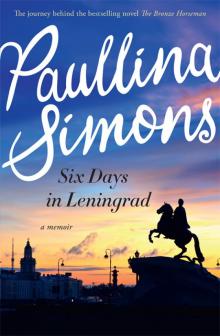 Six Days in Leningrad
Six Days in Leningrad Bellagrand
Bellagrand Tatiana and Alexander
Tatiana and Alexander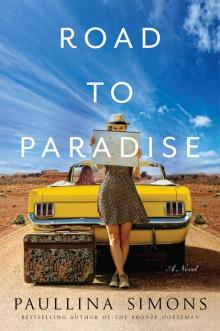 Road to Paradise
Road to Paradise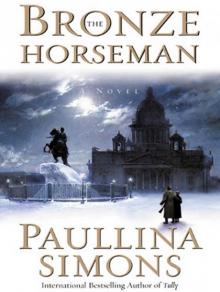 The Bronze Horseman
The Bronze Horseman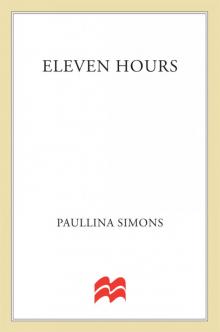 Eleven Hours
Eleven Hours Tatiana's Table: Tatiana and Alexander's Life of Food and Love
Tatiana's Table: Tatiana and Alexander's Life of Food and Love The Girl in Times Square
The Girl in Times Square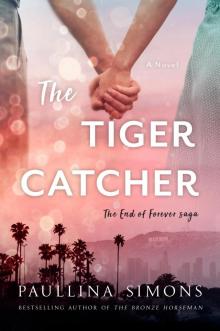 The Tiger Catcher
The Tiger Catcher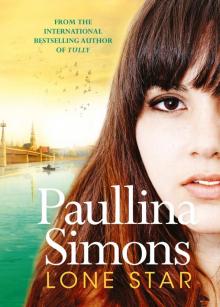 Lone Star
Lone Star Children of Liberty
Children of Liberty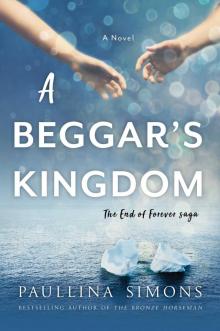 A Beggar's Kingdom
A Beggar's Kingdom Inexpressible Island
Inexpressible Island Tatiana and Alexander: A Novel
Tatiana and Alexander: A Novel Tatiana's Table
Tatiana's Table A Song in the Daylight (2009)
A Song in the Daylight (2009)